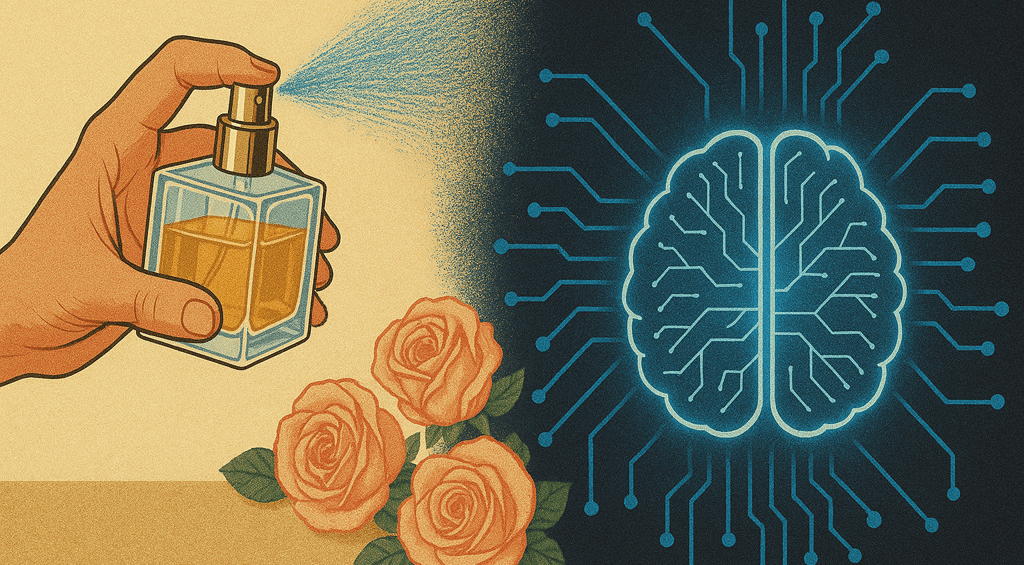Are We Losing the Soul of Perfumery to Algorithmic Trend-Chasing?
AI-generated fragrances and data-driven launches are squeezing out artistry and risking the homogenization of scent.
THE SCENT DAILY
7/6/20253 min read


In recent years, a quiet revolution has taken place on perfume counters and online storefronts worldwide. Hidden beneath glamorous packaging and alluring marketing campaigns is an unsettling question: are we witnessing the slow erosion of artistry in perfumery at the hands of algorithms and data analytics?
The age of big data and artificial intelligence has undeniably transformed industries from finance to fashion. However, in the perfume world, a space traditionally celebrated for creativity, mystery, and emotion, this transformation brings a unique set of challenges. Fragrance, once a deeply personal expression of human creativity and a symbol of individual identity, increasingly feels like it is becoming just another commodity, engineered and optimized through cold calculation.
Today, major fragrance houses routinely employ artificial intelligence to predict which scents will resonate most widely with consumer preferences. AI-driven programs analyze market data, social media trends, consumer feedback, and even neurological responses to identify precisely which fragrance notes and combinations are poised to become bestsellers. The results, often remarkably accurate, produce perfumes that feel familiar, market-friendly, and safe. But therein lies the problem: when everyone chases the same optimized trends, perfumes begin to lose their distinctiveness and start to smell eerily similar.
This data-driven approach is not inherently negative. On the surface, it appears to democratize fragrance, making appealing scents accessible to a broader audience. However, what we risk losing in this exchange is profound. At its core, perfumery is an art form, deeply rooted in intuition, emotion, and daring creativity. It has always been this way. Legendary perfumers like Jean-Claude Ellena, Dominique Ropion, or Francis Kurkdjian have built their careers not merely by predicting what consumers might like, but by boldly presenting scents that challenge and expand our olfactory imagination. Such artistry relies heavily on intuition, emotional resonance, and even risk-taking. In other words, it requires bravery to go against the status quo. Such qualities could not be further from what algorithms do, which is finding the most optimal way to match the status quo.
Algorithmic perfumery inherently prioritizes past consumer behavior, creating an endless loop of familiarity. Fragrance houses chase after already-popular notes—vanilla, oud, citrus—because they promise market success. The result is that innovation suffers, and the market becomes flooded with slight variations of the same perfume archetype. In an ironic twist, the very technology intended to refine and improve the perfume industry may be flattening it into homogeneity.
Consider the era-defining fragrances of past decades: Chanel No. 5, Dior’s Poison, Mugler's Angel. Each of these perfumes broke conventions and set new benchmarks precisely because they defied consumer expectations rather than catering directly to them. These scents did not emerge from careful algorithmic planning; they were bold experiments born of artistic courage and visionary creativity. Could we imagine an algorithm ever daring enough to risk launching something as polarizing and revolutionary as Angel’s gourmand patchouli bomb?
Moreover, perfume is deeply intertwined with memory, emotion, and identity. A scent can evoke nostalgia, represent a milestone, or serve as a personal signature. When perfumery becomes primarily data-driven, it risks becoming transactional, stripped of its emotional depth. Perfumes become temporary commodities rather than enduring expressions of identity and culture.
A parallel can be seen in the music industry, where algorithmically-curated playlists increasingly dominate streaming platforms. Songs optimized for immediate gratification and maximum streams often overshadow experimental or niche music. Similarly, in perfumery, fragrances that offer immediate, algorithmically-predicted appeal may overshadow those that challenge or intrigue the consumer on deeper levels.
Thankfully, pockets of resistance to this homogenization remain. Independent perfumers and niche houses continue to champion creativity, innovation, and authenticity over trend-chasing. Brands such as Frederic Malle, Le Labo, and Byredo remind consumers that perfumery is indeed an art form. These brands thrive not because they deliver predictability, but precisely because they offer originality, nuance, and emotion.
The question for consumers and industry professionals alike is clear: What kind of future do we want for perfumery? Do we embrace algorithmic efficiency and the comfort of familiarity, or do we insist upon maintaining space for the unpredictable, the evocative, and the human? As tempting as it might be to let data guide every decision, perhaps it's worth reminding ourselves—and fragrance houses—that perfume, at its best, is not merely about pleasing the senses. It’s about awakening them, challenging them, and letting our olfactory speak to something deeply human within us.
As we stand at the crossroads of this olfactory evolution, the perfume industry must seek balance. Algorithms undoubtedly offer valuable insights, but they must remain tools rather than masters. Data should be used to enhance rather than dictate creativity. Ultimately, the soul of perfumery rests in its ability to surprise, delight, and evoke genuine emotion. That is something algorithms, no matter how sophisticated, can never fully replicate.


